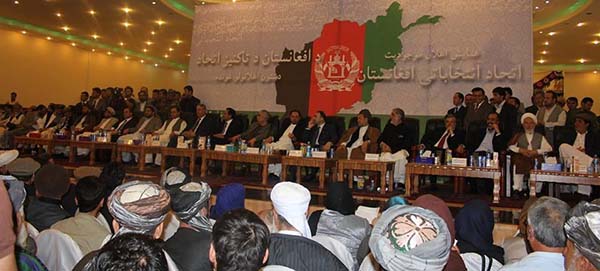KABUL - A gathering of Afghan political figures on Thursday officially announced to the public the formation of grand coalition called the "Afghanistan Electoral Alliance (AEA)," bringing together many of the most prominent political parties and leaders in Afghanistan under one banner.
The alliance has been formed by the Islamic People's Party (IPP), Wahdat-e-Islami Party, National Movement of Afghanistan (NMA), National Coalition of Afghanistan (NCA), National Front Party (NFP), Afghanistan Green Trend (AGT), Afghanistan Naween (AN), Hezb-e-Wahdat, Iqtidar-e-Millie, Itehad-i-Aqwam and Coordination Council of Arab People (CCAP).
Dr. Abdullah Abdullah, leader of the NCA; Atta Muhammad Noor, Governor of Balkh province; Haji Mohammad Mohaqeq, leader of the IPP; Abdul Rasheed Dostum, head of the Junbesh Milli Party (JMP); Salahuddin Rabbani, acting head of the Jameyat Party (JP); Amrullah Saleh, former Director of the National Directorate of Security (NDS); Ahmad Zia Massood, head of the NFP; and Muhammad Younus Qanooni, a member of the JP, were some of the prominent political leaders who attended the meeting and signed the agreement solidifying newly formed alliance.
The AEA announced that it would soon nominate a single candidate for the Presidential elections, which is scheduled to take place on April 5, 2014.
The agreement that the coalition members signed on Thursday states that steps would be taken in order to ensure reforms were brought to the current political system; there is increased participation of people in the political, social and economic arena; there is balanced development and fair distribution of power.
"Signatories of this agreement, provide clear written commitment to the rights and functioning of the parties and groups who are a part of the Electoral Alliance," said Badul Sata Murad, a member of the IPP. "The signatories of this agreement will be the key players in selecting the Presidential candidate and the Vice-Presidents. Decisions would be based on unanimous votes,"
Addressing rumors circulating that Dr. Abdullah would be the group's Presidential candidate, Governor Noor stated firmly that nothing had been decided yet.
"Nothing has been decided about the Presidential candidate, discussions are ongoing between the members," said Noor. "This Alliance will choose someone who can tackle the current challenges and maintain the achievements of the past ten years."
According reports, Zalmay Khalilzad, the former U.S. Ambassador to the United Nations; Ali Ahmad Jalali, former Afghan Interior Minister; Qayoum Karzai, the younger brother of President Karzai; and the Haq-o-Adalat Party did not agree to join the AEA. Earlier in the week, the three high-profile political figures - speculated to be favorites for the Presidency - had met with the heads of the AEA who wanted looked to recruit them to the coalition.
Nevertheless, while the three men were not present on Thursday, and are rumored to have turned down offers to join the AEA, coalition leaders assured that conversations with them, or at least Mr. Khalilzad and Mr. Jalali, would continue.
"Discussions are ongoing with Mr. Khalilzad and Mr. Jalali urging them to join the alliance," said Dr. Abdullah. "Since they were out of country they could not be present in today's (Thursday) meeting, but we hope to have further discussions in the future."
After the Alliance was announced at the press conference in Kabul, Mr. Jalali and Mr. Khalizad both offered a response in which they did not rule out the possibility of joining the coalition down the line. However, both leaders implied they needed a clearer sign from the AEA that it would adequately represent the interests of Afghans in the election.
"I believe every political or non-political institution that is being created or was created, must pay attention to the aspirations and demands of the people, otherwise, they will be rejected by the people," said Mr. Khalilzad. "I would like to repeat that discussions with political parties and the Alliance are ongoing."
According to political analysts, there little certainty in the survival of coalitions like the one announced on Thursday. They feel that due to differences of opinion among the members it is unlikely that the alliances would last to Election Day. They called them "temporary alliances," and said they did not show any signs of stability, which is considered important for the young Afghan political system.
In the list of political parties that have extended their support for the AEA, the Justice and Development Party's (JDP) name also appeared, but the coalition clearly stated that JDP is not a part of the alliance.
As the timeline for the Presidential and Provincial Councils' elections draws near, and the formal Independent Election Commission (IEC) nomination period just around the corner running from mid September to mid October, more announcements are expected from political parties and leaders about alliances being formed, or broken. (Tolo News)

